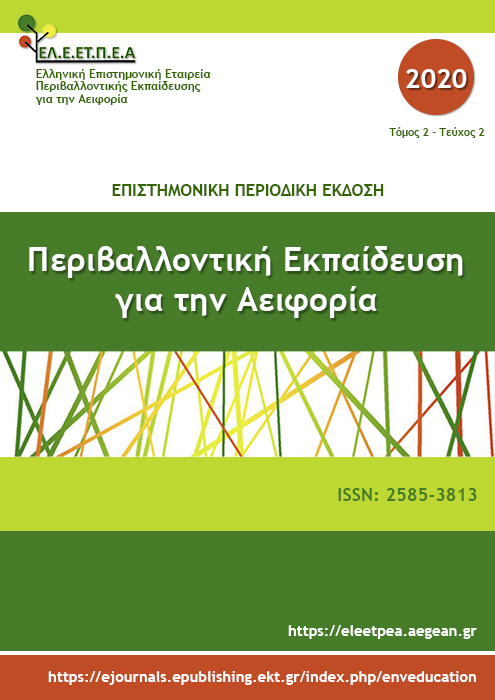Διερεύνηση των παραγόντων που επιδρούν στην πρόθεση συμπεριφοράς για μείωση του οικολογικού αποτυπώματος στο πλαίσιο της εκπαίδευσης για την αειφορία σε βιοσυστήματα
Resumen
Η παρούσα μελέτη διερευνά τους παράγοντες που επιδρούν στην πρόθεση για διαμόρφωση συμπεριφοράς (Behavioral Intention) με στόχο την μείωση του οικολογικού αποτυπώματος (Ecological Footprint) σε βιοσυστήματα (biosystems). Εκατόν τριάντα τέσσερα άτομα από την περιοχή Μεσολογγίου, περιοχή που γειτνιάζει με βιότοπο προστατευμένο από συνθήκη Natura 2000, απάντησαν σε ερωτηματολόγιο το οποίο δομήθηκε με βάση την θεωρία της Προσχεδιασμένης Συμπεριφοράς (Theory of Planned Behavior-TPB). Τα δεδομένα αναλύθηκαν με δείκτες περιγραφικής στατιστικής προκειμένου να εξεταστούν οι μεταβλητές που διαμορφώνουν την πρόθεση της συμπεριφοράς του ατόμου για Αειφορία (Αειφόρο Σχολείο). Το μοντέλο βρέθηκε να είναι στατιστικά σημαντικό (p<0.05), ενώ το 61.90% της διακύμανσης της πρόθεσης συμπεριφοράς ερμηνεύτηκε με βάση τις ανεξάρτητες μεταβλητές του μοντέλου. Τα αποτελέσματα δείχνουν ότι το μοντέλο της TPB αποτελεί ένα σημαντικό εργαλείο πρόθεσης συμπεριφοράς και ευαισθητοποίησης μιας τοπικής κοινότητας προς την αειφόρο ανάπτυξη αναδεικνύοντας την ανακύκλωση στην πηγή, μέσω της κομποστοποίησης, ως μια αειφορική δράση που μπορεί να οδηγήσει στην μείωση του οικολογικού αποτυπώματος στον τοπικό οικοσύστημα.
Article Details
- Cómo citar
-
Γιαννακόπουλος Ε. (2020). Διερεύνηση των παραγόντων που επιδρούν στην πρόθεση συμπεριφοράς για μείωση του οικολογικού αποτυπώματος στο πλαίσιο της εκπαίδευσης για την αειφορία σε βιοσυστήματα. Περιβαλλοντική Εκπαίδευση για την Αειφορία, 2(2), 41–55. https://doi.org/10.12681/ees.23202
- Sección
- Articles

Esta obra está bajo una licencia internacional Creative Commons Atribución-NoComercial-CompartirIgual 4.0.
Οι συγγραφείς διατηρούν τα πνευματικά δικαιώματα και παρέχουν στο περιοδικό το δικαίωμα της πρώτης δημοσίευσης μαζί με την αδειοδότηση της εργασίας με CC-BY-NC-SA, που επιτρέπει σε άλλους να μοιράζονται αυτή την εργασία με αναγνώριση του συγγραφικού δικαιώματος και την αρχική δημοσίευση σε αυτό το περιοδικό.


